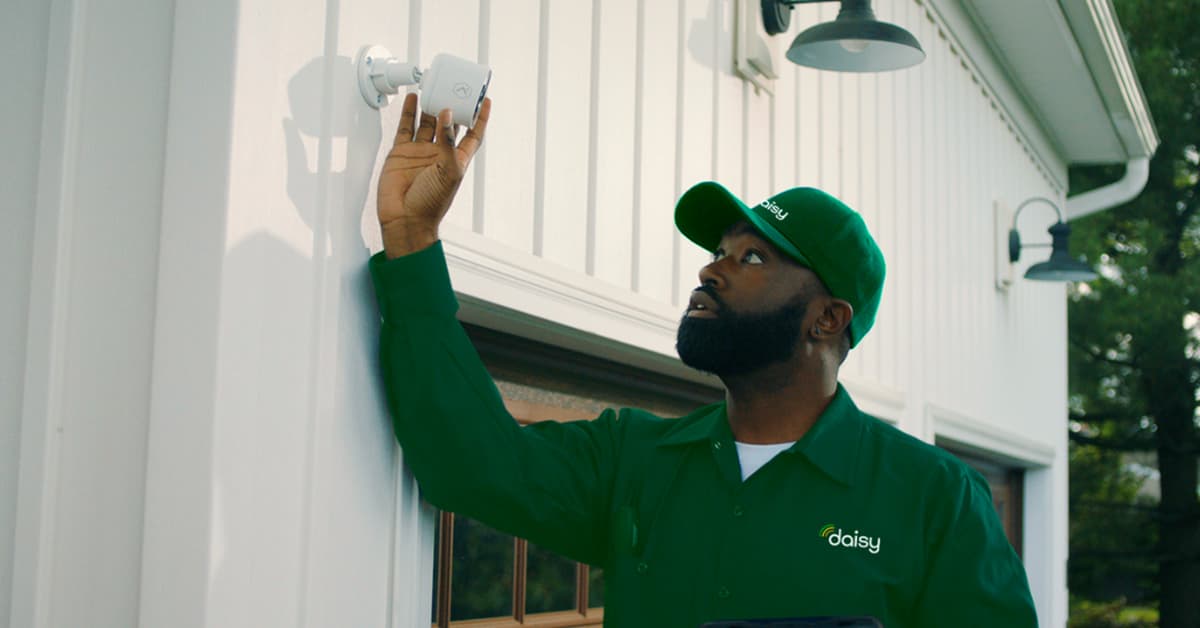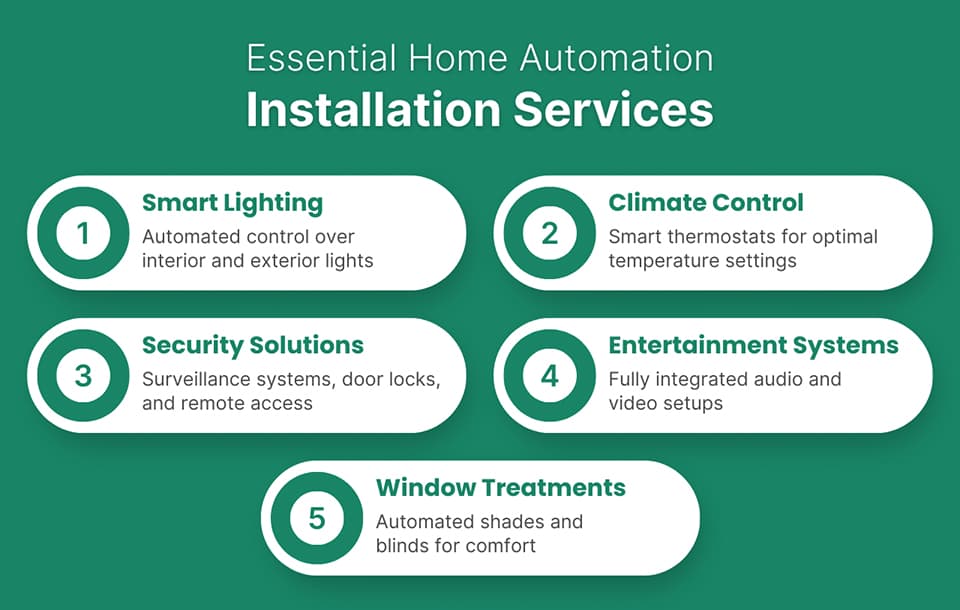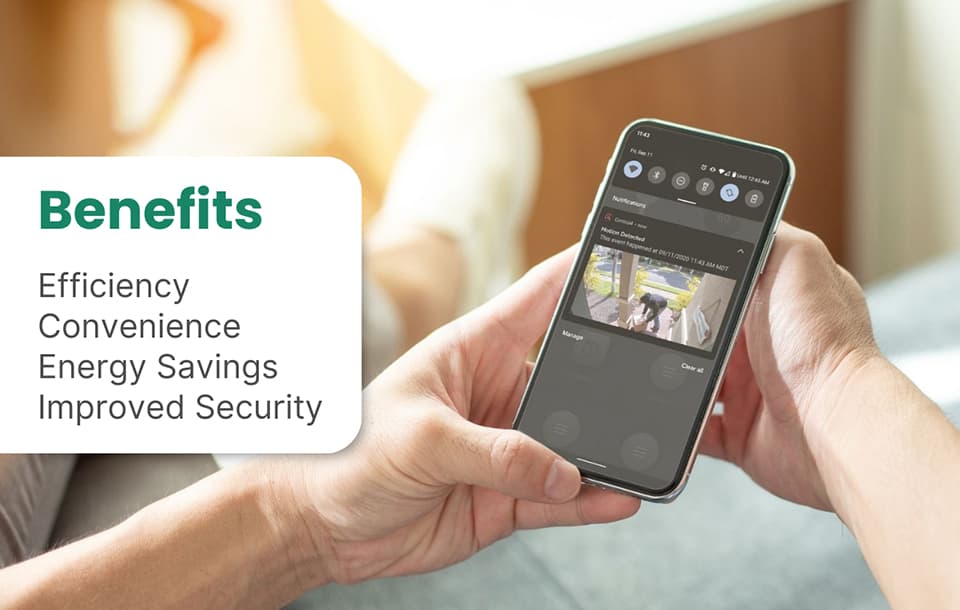A Practical Guide to Home Automation Installation Services

Home automation installation services can transform your regular house into a smart home, providing convenience, security, and energy efficiency. If you're looking to simplify your life with easy control over your home systems, look no further. At Daisy, we strive to offer the most seamless and reliable Home automation installation service; each home automation installation service can be custom to your specific needs, turning your residence into a cutting-edge, responsive environment.

How Home Automation Works
Home automation involves using smart devices, sensors, and software to make your home more efficient and convenient. At the heart of this system is a central hub that connects all your devices. You can control everything through a mobile app on your smartphone or tablet.
Smart devices can include anything from lights and thermostats to security cameras and door locks.
- Wi-Fi: Commonly used for high-bandwidth devices like cameras and streaming services.
- Zigbee and Z-Wave: Ideal for low-power devices like sensors and smart locks. They create a mesh network, which means each device helps relay signals to other devices, improving overall system reliability.
- Bluetooth: Often used for short-range communication between devices like speakers and door locks.
Imagine you’re on vacation and want to check on your home. You can use your mobile app to see live feeds from your security cameras, adjust the thermostat, or even turn on lights to make it look like someone is home.
Benefits of Home Automation
Home automation offers numerous benefits that can significantly improve your daily life.
- Convenience: Control all your home systems from a single app. Whether it's adjusting the thermostat from your bed or turning off all lights with a single tap, convenience is a major perk.
- Efficiency: Automate routine tasks. For example, set your home to lock itself at 10 p.m. or have your shades close automatically when the sun hits them directly.
- Energy Savings: Smart thermostats and lighting systems help you save on energy bills. Adjust settings based on your daily routines to optimize energy use.
- Improved Security: Improve your home’s security with smart locks, video doorbells, and surveillance cameras. Monitor and control your security systems remotely to keep an eye on your home at all times.

For example, one of our clients, a frequent traveler, uses our automation services to manage their home remotely. They can check security cameras, adjust the thermostat, and even let in service professionals through smart locks—all from their smartphone. This has given them peace of mind and saved them on energy costs.
Home automation is therefore more than just a trend. It’s a practical solution that makes your home smarter, safer, and more efficient. Whether you’re looking to save on energy bills, improve security, or just make daily tasks easier, home automation has something to offer.
So why should you consider hiring professional Home automation installation services?
When setting up a smart home, hiring professional home automation installation services can make a world of difference. Here’s why:
Knowledge and Expertise
Licensed specialists bring a wealth of knowledge and expertise to the table. They are often accredited and licensed in various automation-related fields like electronic network security and alarm systems. Many professionals are members of industry associations such as the Custom Electronic Design & Installation Association (CEDIA), which ensures they stay updated with the latest technologies and best practices.
These specialists undergo rigorous training and testing, which means they can handle all aspects of your smart home setup—from integrating complex systems to troubleshooting issues. This expertise ensures that your home automation system is installed correctly and operates seamlessly.
Security and Insurance
Security is also a significant concern when it comes to home automation. Professionals bring a heightened level of security to your system, ensuring that all devices are properly set up to prevent hacking or unauthorized access. They are knowledgeable about network security protocols and can implement measures to protect your home’s data.
In addition to technical security, reputable smart home specialists are backed by insurance. They carry general liability insurance and workers' compensation, which protects both you and them in case of any mishaps during installation. Many are also professionally bonded, providing an extra layer of assurance that you’re working with a reliable contractor.
Installing a home automation system can be a substantial investment—up to $1,400. Ensuring that you have the right insurance coverage helps protect this investment.
Ongoing Service and Support
Another standout benefit of hiring a professional is the ongoing service and support they offer. After installation, you’re not left to figure things out on your own. These professionals provide valuable advice on optimizing your system, such as which materials won’t block Wi-Fi signals and how to save on utility bills. They also offer troubleshooting and security tips to ensure your system runs smoothly. When something goes wrong—and with technology, it inevitably will—you can rely on the folks who installed your system to fix it. This ongoing support can save you time, stress, and potentially more money in the long run.
Quote: "Nobody knows your system better than the folks who installed it, so it feels good to know you have someone to call should something go wrong down the line."
In summary, the expertise, security, insurance, and ongoing support provided by professional home automation installation services make them invaluable.
Cost of Home Automation Installation
Factors Influencing Cost
When considering home automation installation services, several factors can significantly impact the overall cost. These include:
- Location: Prices can vary based on where you live. Urban areas with higher living costs often see higher installation fees compared to rural areas.
- Service Plan: The type of service plan you choose will also affect the price. Basic plans might cover essential installations, while premium plans could include advanced features, ongoing support, and extended warranties.
- System Complexity: The more intricate your home automation system, the higher the cost. A simple setup with a few smart lights and a thermostat will be cheaper than a comprehensive system that includes security cameras, smart locks, HVAC control, and integrated audio systems.
- Labor and Material Costs: The cost of labor can range from $40 to $80 per hour, depending on the specialist's expertise and your location. Additionally, the materials needed for prewiring, mounting devices, and other installations will add to the total cost.
Is Home Automation Worth It?
Home automation offers numerous benefits that can make it worth the investment for many homeowners. Here are some key advantages:
- Convenience: Control your home's lighting, climate, and security systems from your smartphone or a central hub.
- Energy Savings: Smart thermostats and lighting systems can reduce energy consumption, lowering your utility bills.
- Improved Security: Smart locks, cameras, and sensors improve your home's security, providing peace of mind.
- Efficiency: Automate routine tasks like adjusting the thermostat or turning off lights, saving time and effort.
However, it's important to consider the potential drawbacks, such as the initial cost and the risk of cybersecurity threats. Ensuring proper security measures are in place can mitigate these risks.
How Much Does a Daisy Home Automation System cost?
The cost of a Daisy home automation system can vary widely based on the complexity and features you choose. Daisy systems are known for their high-quality and customizable solutions, making them a popular choice for luxury home automation.
- Basic Systems: Starting at around $1,000, these systems might include essential features like smart lighting and basic security.
- Moderate Systems: These can range from $3,000 to $10,000 and include more integrated devices, such as smart thermostats, advanced security features, and multi-room audio systems.
- Advanced Systems: High-end Daisy systems can cost upwards of $10,000, featuring extensive integration, custom automation sequences, and premium components.
Why Choose Daisy?
At Daisy, we believe that home automation is not just about technology—it's about enhancing your lifestyle. Our luxury automation solutions are designed to seamlessly integrate into your home, providing convenience, security, and efficiency.
Bespoke Design
Every home is unique, and so are your needs. That’s why we offer bespoke design services to tailor your home automation system specifically to you. Whether you want your home to wake you up with natural light and a freshly brewed coffee or to switch to an "entertainment" mode with the touch of a button, we make it happen.
Ongoing Maintenance
Our commitment to you doesn’t end after installation. We provide ongoing maintenance to ensure your system continues to operate at peak performance. From troubleshooting to updates, our team is always ready to assist you. We also offer 24/7 emergency service to address any urgent issues that may arise.
Client Satisfaction
Your satisfaction is our top priority. We pride ourselves on delivering exceptional customer service, from the initial consultation to post-installation support. Our team of experts is dedicated to making your transition to a smarter home as smooth and enjoyable as possible.
Ready to lift your living experience? Find our smart home systems and let Daisy guide you into a future of unparalleled comfort and convenience.
Thank you for choosing Daisy for your home automation needs. We look forward to helping you create a home that not only meets but exceeds your expectations.
